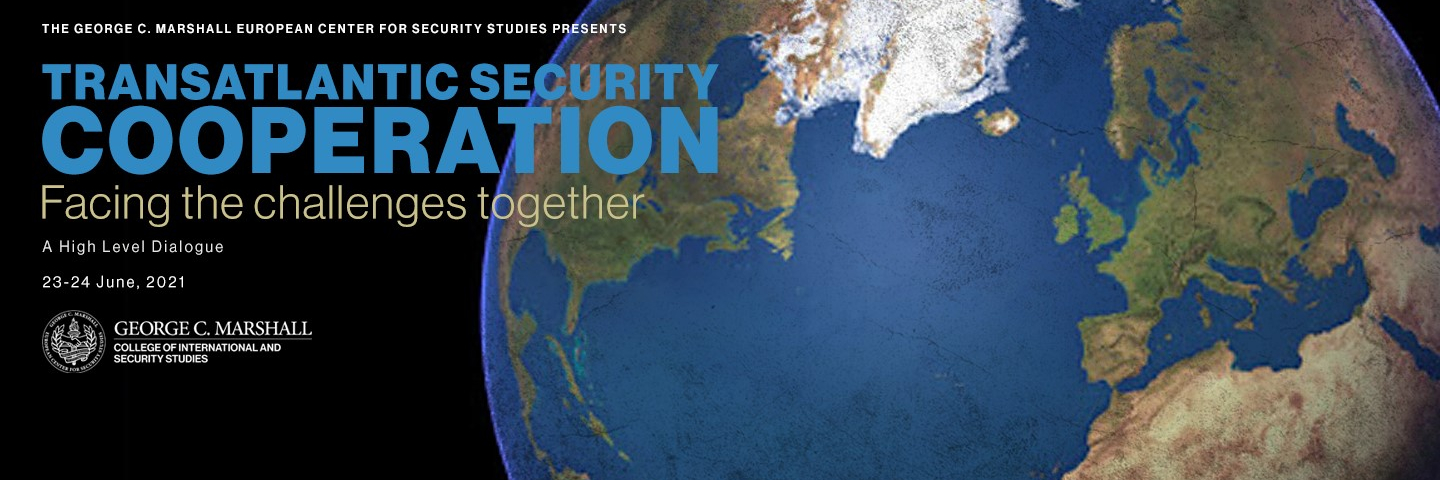
Marshall Center Holds Its 2021 High Level Dialogue On Transatlantic Security Cooperation
By Fritz Rademacher
College of International and Security Studies
George C. Marshall European Center for Security Studies
GARMISCH-PARTENKIRCHEN, Germany (June 30, 2021) - Following the series of international summits and meetings, the Marshall Center held its virtual 2021 High Level Dialogue on “Transatlantic Security Cooperation – Facing the Challenges Together” in the presence of its new Director, Maj. Gen. (Ret.) Barre R. Seguin on 23-24 June 2021. Thirty high-ranking officials at the level of junior ministers, ambassadors and flag officers from sixteen Allied and partner countries participated actively in the strategic dialogue.
Distinguished speakers and panelists included: the Chairman of the European Union Military Committee, General Claudio Graziano from Italy, who delivered the key note address; the Director General for Security and Defense Policy in the German Ministry of Defense, Dr. Detlef Waechter; the Deputy Assistant Secretary of Defense for European and NATO Policy in the U.S. Department of Defense, Spencer P. Boyer; the Director of Foreign and Defense Policy at the American Enterprise Institute, Dr. Kori Schake; the Director General of the Romanian Diplomatic Institute, Dr. Iulian Fota; Nonresident Senior Fellow at the Center on the United States and Europe, The Turkey Project, The Brookings Institution, Dr. Kemal Kirisci; and the Editor-in-Chief of Ukraine Analytica and Director of Security Programs at the Foreign Policy Council “Ukraine Prism”, Dr. Hanna Shelest.
During the first day, participants assessed the transatlantic community’s current and future strategic challenges and opportunities and formulated transatlantic mitigation strategies. They underscored that the Transatlantic Alliance will remain the foundation for the common security and the essential forum for decision making, collaboration and action based on shared interests and values. The strong reaffirmation of U.S. commitment to NATO and its Article 5 by the Biden administration was welcomed unanimously.
The High Level Dialogue addressed the complex challenges posed by Russia and China, recognizing that a unified West acting together was the most stabilizing force in the rules-based international order. Upholding this order and pushing back on authoritarianism was deemed paramount and requires continuous effort and steadfastness. Participants agreed that more is still needed to be done in terms of sharing responsibilities equitably, improving the readiness of our forces, increasing the speed of decision making, and ensuring adequate funding. Strategic cooperation between the U.S. and Germany was seen as key to a strong and durable transatlantic relationship.
On the second day, the program analyzed the implications of transatlantic security cooperation in the Black Sea area, highlighting the strategic importance of the region for security and stability. In view of Russia’s aggressive actions and its continued provocations, it was recommended that the transatlantic community place a stronger focus on the region and develop a comprehensive and unified strategic approach through NATO consistent with the Euro-Atlantic rules-based order.
The 2021 High Level Dialogue is part of a three-year cycle of Senior Executive Seminars which the Marshall Center is organizing for Alumni and newcomers alike. The cycle is focusing on the overarching theme of transatlantic security cooperation in an era of global challenges and strategic competition. Next year’s Senior Executive Seminar will be held in Garmisch-Partenkirchen in June 2022 and will offer the participants the opportunity to address in detail key issues of transatlantic interest against the background of the new and updated NATO Strategic Concept, the European Union’s Strategic Compass, and the United States’ next National Security Strategy.